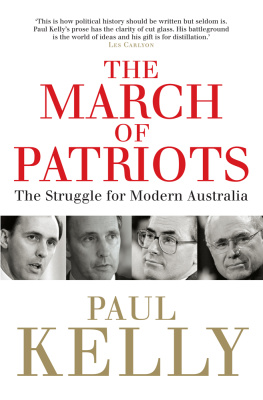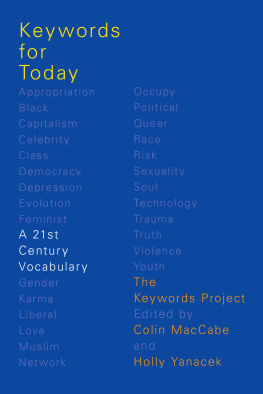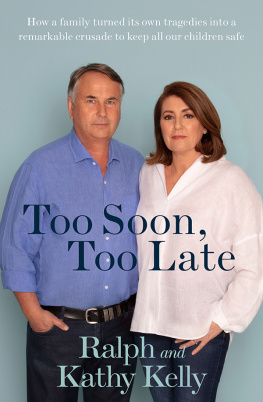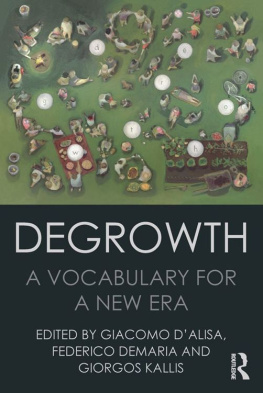Kelly Fritsch - Keywords for Radicals: The Contested Vocabulary of Late-Capitalist Struggle
Here you can read online Kelly Fritsch - Keywords for Radicals: The Contested Vocabulary of Late-Capitalist Struggle full text of the book (entire story) in english for free. Download pdf and epub, get meaning, cover and reviews about this ebook. year: 2016, publisher: AK Press, genre: Politics. Description of the work, (preface) as well as reviews are available. Best literature library LitArk.com created for fans of good reading and offers a wide selection of genres:
Romance novel
Science fiction
Adventure
Detective
Science
History
Home and family
Prose
Art
Politics
Computer
Non-fiction
Religion
Business
Children
Humor
Choose a favorite category and find really read worthwhile books. Enjoy immersion in the world of imagination, feel the emotions of the characters or learn something new for yourself, make an fascinating discovery.

- Book:Keywords for Radicals: The Contested Vocabulary of Late-Capitalist Struggle
- Author:
- Publisher:AK Press
- Genre:
- Year:2016
- Rating:3 / 5
- Favourites:Add to favourites
- Your mark:
- 60
- 1
- 2
- 3
- 4
- 5
Keywords for Radicals: The Contested Vocabulary of Late-Capitalist Struggle: summary, description and annotation
We offer to read an annotation, description, summary or preface (depends on what the author of the book "Keywords for Radicals: The Contested Vocabulary of Late-Capitalist Struggle" wrote himself). If you haven't found the necessary information about the book — write in the comments, we will try to find it.
Kelly Fritsch: author's other books
Who wrote Keywords for Radicals: The Contested Vocabulary of Late-Capitalist Struggle? Find out the surname, the name of the author of the book and a list of all author's works by series.
Keywords for Radicals: The Contested Vocabulary of Late-Capitalist Struggle — read online for free the complete book (whole text) full work
Below is the text of the book, divided by pages. System saving the place of the last page read, allows you to conveniently read the book "Keywords for Radicals: The Contested Vocabulary of Late-Capitalist Struggle" online for free, without having to search again every time where you left off. Put a bookmark, and you can go to the page where you finished reading at any time.
Font size:
Interval:
Bookmark:
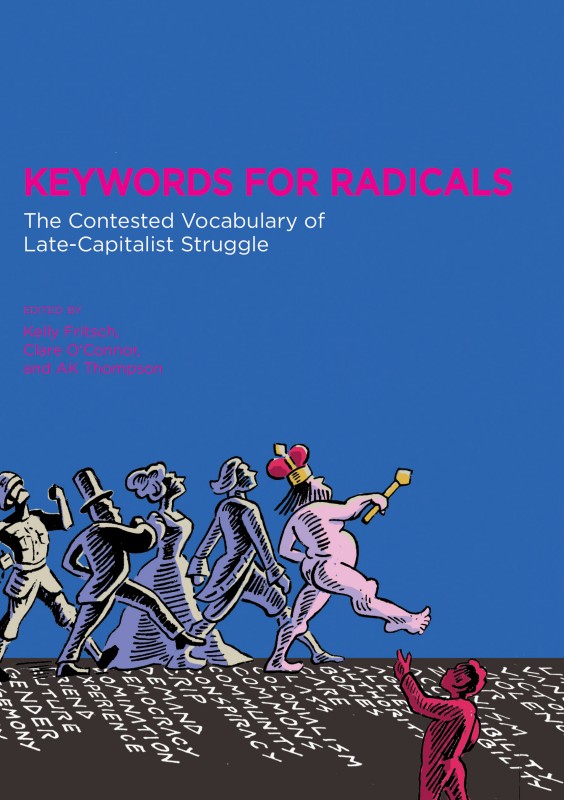
Keywords for Radicals
The Contested Vocabulary of Late-Capitalist Struggle
Kelly Fritsch
Clare OConnor
AK Thompson
AK PRESS
Kelly Fritsch, Clare OConnor, and AK Thompson
In 1837, Hans Christian Andersen recounted the story of The Emperors New Clothes. Working in the fantastical register of fairy tales, he spun a tale in which two swindlers descend upon the town of an emperor enthralled by sartorial decadence. Sensing an opportunity, the swindlers pose as weavers and propose to make the emperor a suit so fine that it will be imperceptible to people who were stupid or undeserving of their post. Seeing the benefit of owning such an outfit, the emperor agrees to their offer. As the swindlers begin their fictive weaving, a novel problem arises. Fearful that their credibility was about to be undermined, the emperors men repeat the received lie and extol the beauty of the mystery garment. The ruse becomes contagious. Finally, faced with underlings capable of seeing the invisible suit, the emperor succumbs as well. The scene leads inexorably to a procession through the town. Invested in the preservation of the lie, the cheering crowd gives no indication that anything is amissthat is, until a young boy, lacking in social graces and too nave to play along, shouts out what the others could not: But he has nothing on! (Andersen 1983, 63).
In most riffs on Andersens story, the lesson is drawn out at this point: by speaking truth to power, we can break the spell that keeps us ensnared. Calling things like we see them forces convenient fictions to give way to more vital truths. Perverse beliefs that fester in shadows get disinfected in reasons light. Things become clear when properly named. For those with radical inclinations, such an account is exceptionally appealing. From the Quaker commitment to speak truth to power in the face of the Cold War to Malcolm Xs philological injunction to make it plain, our political struggles have been indelibly marked by the desire for transparency. Its therefore not surprising that radicals have instinctively recognized the importance of Andersens tale. Indeed, as with Malcolm (and the Quakers before him), The Emperors New Clothes is historically inseparable from revolutionary aspirations. Critical of the mystical claims underlying the power of his own eras aristocracy, Andersen became a child of the Enlightenment, which valued the implicitly democratic evidence of sense perception above all. Today, confronted by public relations machines still more murderous in their deceit, we strive in our turn to model ourselves after Andersens child. On guard against the sleights of hand that would keep us in line, we do what we can to tell it like it is. It is therefore not surprising that our campaigns have often taken root at the very point where, beneath the ruse, things and their names begin to coincide. Iraq is a war for oil ; Israel is an apartheid state . The payoff is clear: once proper names have been assigned and mystifications dissolve, the revelation will compel our fellow townsfolk to challenge the emperors vain conceits.
But if theres one thing such campaigns have made clear, its that purely nominal shifts are never enough to resolve our political problems once and for all. On the contrary, when radicals become seduced byand habituated tothe belief that we can assign true names, we have often ended by hampering our efforts. How, then, should we orient to struggles over word usage and meaning? What other approach might guide our efforts? Covering a wide range of the keywords that currently shape radical discourse and subjecting them to historical, etymological, and political scrutiny, the entries in this volume suggest one compell ing path.
* * *
Leaving aside its literary virtuosity, The Emperors New Clothes owes its popularity to the seductive promise of naming. A major problem, however, is that the fables lesson tends to get extracted before the story has come to a close. Admittedly, Andersens tale is briefnot more than a few pages longand the young boys mouths-of-babes moment comes in the very last paragraph. Nevertheless, the story does not end with the childs outburst or with the townsfolk shaken from slumber. Instead, it ends with the emperor, and his chamberlains who commit all the more resolutely to keep up appearances: But he has nothing at all on! at last cried out all the people. The Emperor was vexed, for he knew that the people were right; but he thought the procession must go on now! And the lords of the bedchamber took greater pains than ever, to appear holding up a train, although, in reality, there was no train to hold (Andersen 1983, 63).
When approached from the standpoint of its closing lines, Andersens fable seems to support conclusions that are entirely at odds with those normally derived from it. Significantly, the final scene makes clear that proper naming is not enough to bring the royal procession to a halt. Moreover, since the parade does not end (since, indeed, the emperor and his chamberlains redouble their efforts to persevere), its unclear whether the townsfolk will turn on their sovereign or strive instead to avoid conflict by somehow reconciling the tension between their rulers charade and their own sense p erception.
Of these two outcomes (and despite the Enlightenment), the latter has proven historically to be more likely. Incensed Americans who owe their very hubris to imperialist aggression ask, Why do they hate us? Discount shoppers rush to Walmart on Black Friday to revel in the fruits of the global sweatshop without ever curbing their xenophobic injunction to buy American. Heavily medicated suburban kids insist its all good. Through incantations such as these, people symptomatically acknowledge what they stand to lose if the faade crumbles. Faced with the irreconcilability of the given and the evident, those whose lives are beholden to constituted power are more likely to entrench themselves in fictive certainties than they are to renounce them once and for all.
On this point, Andersens story proves prescient. Populated by townsfolk, servants, high-ranking officials, and entrepreneurial swindlers, the inhabitants of the emperors kingdom are marked by clear class divisions. But while this taxonomy might imply conflict, Andersens characters seem for the most part to be enthralled by their sovereigns excess. Indeed, they are invested in it. Had they not lined the streets to bask in the glow of his power, the realization that his new clothes left him naked would not have been bewildering. Indeed, had it not been for their investment, they might have freed themselves from resplendent misery long before the weaving swindlers made their descent. And who, in the story, is prepared to speak about that ? Certainly not the swindlers, since they flee the scene before the procession begins. Consequently, even if the peoples shock turned to rage (even if their realization foretold a scene of wild defrocking), the profiteering culprits are beyond their grasp. The crowds indictment cannot touch them. The same holds true today: like Andersens townsfolk might have done before us, we gradually turned our anger toward the kleptocratic Goldman Sachs. We became smug in our shouting, and for a while we took back the streets. But while we may have changed the conversation, our hoarse voices ultimately underscored our power lessness.
* * *
Revisiting Andersens fable in this way is illuminating. By turning our attention toward those aspects of the story that normally escape consideration, it becomes clear that speaking truth to power and making it plain are no longer enoughand not solely because, today, power has displayed a remarkable capacity to operate under conditions of extreme contr adiction.
Font size:
Interval:
Bookmark:
Similar books «Keywords for Radicals: The Contested Vocabulary of Late-Capitalist Struggle»
Look at similar books to Keywords for Radicals: The Contested Vocabulary of Late-Capitalist Struggle. We have selected literature similar in name and meaning in the hope of providing readers with more options to find new, interesting, not yet read works.
Discussion, reviews of the book Keywords for Radicals: The Contested Vocabulary of Late-Capitalist Struggle and just readers' own opinions. Leave your comments, write what you think about the work, its meaning or the main characters. Specify what exactly you liked and what you didn't like, and why you think so.

